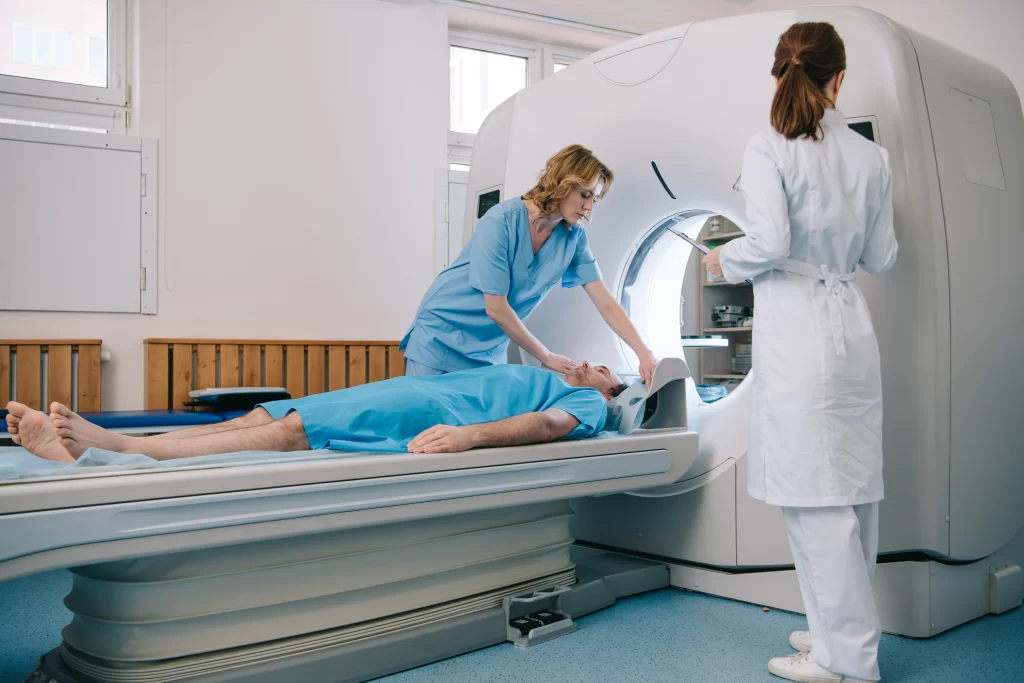What Is a Nocturnal Seizure?
Nocturnal seizures are episodes of epilepsy that occur while a person is sleeping. They can result in unusual behaviour of the individual, including sudden wake-ups for no reason, night-wetting, or uncontrolled and jerking movements of the body.
In most cases, people with nocturnal seizures experience a tonic-clonic seizure during sleep. Night-time epileptic seizures can occur in three different intervals, including:
- Immediately after falling asleep
- Before waking up
- Right after waking up
Nocturnal epileptic spasms or seizures are often associated with nocturnal frontal lobe epilepsy. It is a form of epilepsy that involves an outburst of electrical activity in the frontal lobe of the brain.
Whilst there is no known cause of the sudden surge of electrical brain activity, experts suggest that lack of sleep may be a potential trigger of seizures in people with epilepsy.
Therefore, nocturnal seizures that cause sleep deprivation are linked to an increased risk of further epileptic episodes.
Mini Seizures While Falling Asleep
Mini nocturnal seizures can occur during or immediately after falling asleep. Sometimes, these seizures occur during the daytime when a person is feeling drowsy and falling asleep, when people with epilepsy may experience:
- Uncontrolled movements of the arms and legs
- Stiffening or jerking of the muscles
- Feeling confused or lightheaded
- Wetting in the bed
Epileptic seizures that are sleep-related may be lifelong conditions, but they can be kept under control with proper medications and treatment.
Nocturnal Epilepsy Meaning
Epilepsy is a neurological disorder involving a sudden and unexpected surge in the electrical brain activity resulting in seizures or episodes of unusual sensations, movements, or lapses of awareness.
Most forms of epilepsy present with seizures while you are awake. However, some epileptic episodes can occur when you are sleeping. Seizures during sleep can appear with any type of epilepsy.
Several types of epilepsy with nocturnal seizures first appear in childhood. The most common cause of seizures during sleep in children is benign Rolandic epilepsy. Frontal lobe epilepsy, a form of focal (partial) epilepsy, is the most frequent cause of night seizures in adults, and it’s related to sleep disturbance and unusual behaviour.
The most common types of epilepsy associated with nocturnal seizures include
- Juvenile myoclonic epilepsy
- Benign Rolandic syndrome
- Frontal lobe epilepsy
- Tonic-clonic seizures during sleeping
- Electrical status epilepticus in sleep, also known as childhood-onset epileptic encephalopathy
- Landau-Kleffner syndrome
Some people have seizures only when awake, while others can experience daytime and night-time episodes. In some cases, people can have epileptic seizures only while sleeping, a condition known as nocturnal epilepsy.
Symptoms of Nocturnal Seizures
Many individuals with nocturnal seizures are not aware of having them. Signs and symptoms of night-time seizures may remain unnoticed for a certain period as they occur when the person sleeps.
A survey suggests that almost 20% of people with epilepsy have only nocturnal seizures, 40% experience seizures while awake, and 35% have both.
Common symptoms of a seizure during sleep are similar to daytime seizures, and they include:
- Biting your tongue
- Losing bladder control and wetting the bed
- Difficulty waking up after a seizure
- Headache or feeling confused after waking up
Nocturnal seizures can also appear with specific involuntary movements such as:
- Muscle twitching or jerking
- Falling out of bed
- Making unusual voices or crying out
- Convulsions or muscle stiffness
- Unusual movements or postures while sleeping
Nocturnal seizures sometimes resemble sleepwalking, and people might get out of bed and walk around pointlessly. You can only be sure you had a seizure during sleep through medical testing.
People who have had a night-time seizure may be difficult to wake up in the morning.

Causes of Nocturnal Seizures
Most nocturnal seizures are caused by epilepsy. The condition describes a group of distinct seizure disorders that can appear at any age in our life.
It’s important to highlight that not every seizure is caused by epilepsy. Medical experts can diagnose epilepsy only if the person has experienced two or more seizures without an underlying reason.
It is difficult to detect the precise cause that triggered the electrical activity in the brain resulting in a seizure. Potential causes of nocturnal epilepsy include:
- Genetic dispositions running in the family
- Traumatic head or brain injury
- Serious brain infections
- Stroke
- Restrictions in blood flow in the brain or vascular malformations
- Tumours or another ongoing disease in the brain
Evidence shows that some people are more susceptible to developing epilepsy in their lifetime, including:
- People with a family history of epilepsy
- Epilepsy is most frequently diagnosed in children in the first years of life
- People under the age of 55 due to increased risk of strokes, Alzheimer’s or another brain-related disease that is associated with epilepsy
Diagnosing Nocturnal Seizures
Diagnosing nocturnal seizures can be challenging as the symptoms often mimic sleepwalking or night terrors.
In many cases, you can wake up with a bruise you didn’t have before or with pain in your mouth if you have bitten your tongue during the nocturnal seizure.
People who experience difficulty waking up in the morning, headaches or unexplained confusion should talk to their physician, who will indicate several examinations to determine the cause.
To diagnose epilepsy, people need to undergo specific tests and analyses before setting up the precise diagnosis, including:
- EEG: electroencephalogram to measure the electrical activity in the brain
- MRI: magnetic resonance imaging that produces detailed three-dimensional images of the body
- CT: computed tomography to detect any injuries, diseases or malformations in the body
- Polysomnography: sleep study to determine any sleep disorders or sleep-related diseases
What Is SUDEP?
SUDEP is a sudden unexpected death in people with epilepsy that does not result from a drowning, injury or other seizure-related cause.
Studies suggest that SUDEP is rare and affects 1 in 1,000 people with epilepsy. In most cases, SUDEP occurs during or after the epileptic episode due to possible seizure complications.
The potential incidence of SUDEP emphasises the importance of proper medications and treatment for people with nocturnal epilepsy.

Nocturnal Seizures in Children
Nocturnal seizures in children can be difficult to diagnose because they mimic other conditions like night terrors, myoclonus, hiccups, etc.
In children, most nocturnal seizures occur due to benign Rolandic epilepsy, which is the most common form of epilepsy in young children. Typically, it disappears until adolescence or adulthood. It appears to be running in families, and the parents can spot the unusual behaviour of their children, or they may complain of intense headaches (migraines).
Juvenile myoclonic epilepsy is also associated with a night-time seizure, usually developing in adolescence. The underlying cause is unknown, and doctors usually relate it to genetics.
However, not all seizures in children indicate epilepsy. Almost 5% of children younger than five can experience febrile seizures, also called convulsions, that appear when a child has a fever.
Treatment and Prevention of Nocturnal Seizures
Having nocturnal seizures imposes a potential danger and risk to the health and well-being of people with epilepsy. Individuals who live with nocturnal seizures may be prone to injuries, as well as to low oxygen or blood pressure levels during and after the epileptic episode.
In addition, they might continue having altered brain activity after the seizure. Therefore, proper treatment and regular support are essential for people with nocturnal epilepsy to live a safe and fulfilling life.
Unquie Community Services has a unique programme for supporting people with different epileptic disorders, including nocturnal seizures.
We deliver all-encompassing care at home, tailored to the needs of the individual. When caring for people with nocturnal epilepsy, our team provides emotional support, ensuring that people focus on the bright side of life while keeping them safe at the same time.
Importance of Waking Night Home Care in Nocturnal Seizures
For people with nocturnal epilepsy, waking night care at home is paramount for keeping them safe and sound during the night. Having someone to care for you during the nights, especially when living alone, is crucial for your physical and emotional welfare.
Waking night home carers create a trusting and comfortable environment for people with night-time seizures to ensure their good night’s sleep and well-being.
Our support workers are awake all night, ready to act and assist at any moment during the nights of care. From personal care to medication administration and emotional support, our waking night care at home entails all-around support tailored to the needs of the individual.
Feel Safe at Night with Unique Community Services
At Unique Community Services, our waking night home carers provide all the caring duties during night hours. We create a personalised night care plan designed for the needs of the individual. We provide 24/7 and short-term packages, depending on the person’s needs and preferences.
We provide the highest quality standards of care by delivering humanised support and full-round care to keep people safe during their hours of sleep. We keep a history of what triggered the seizures and ensure control of any possible cause that could lead to an epileptic episode.
Unique Community Services creates compassionate and friendly relationships with the people we serve, making them feel safe and comfortable during their hours of sleep. Having a good night’s sleep is crucial for people with epilepsy, and we help that happen with our professional waking night care at home.
